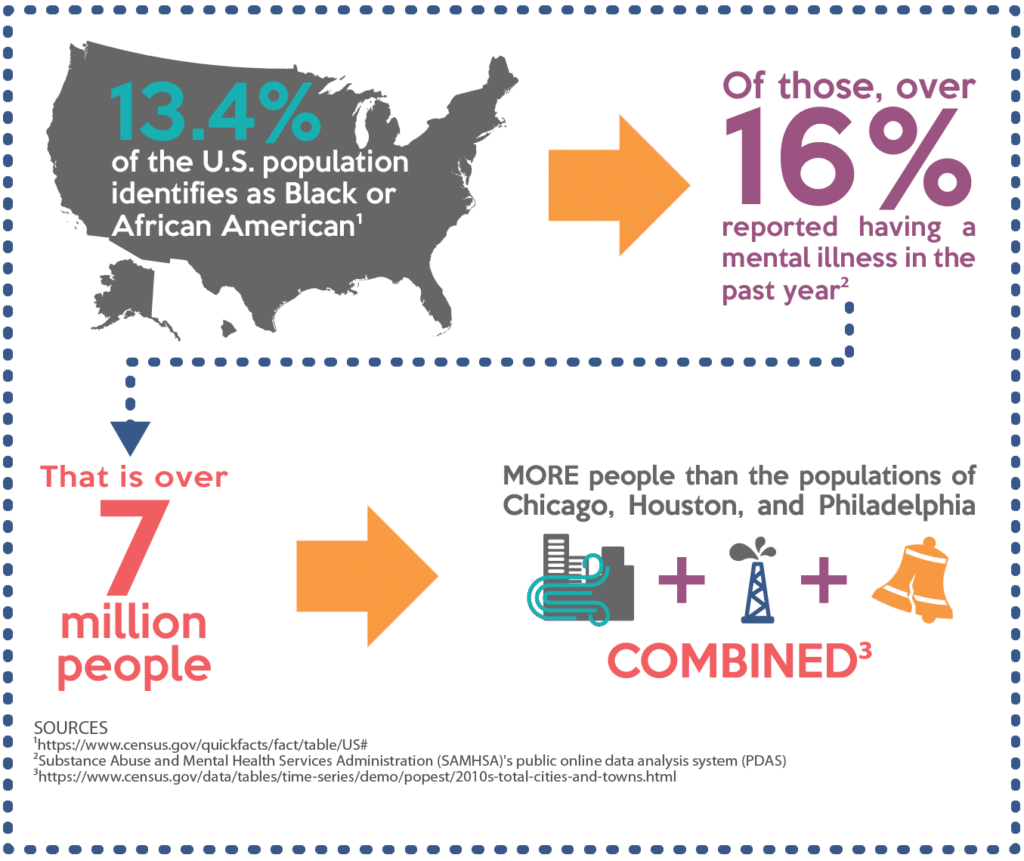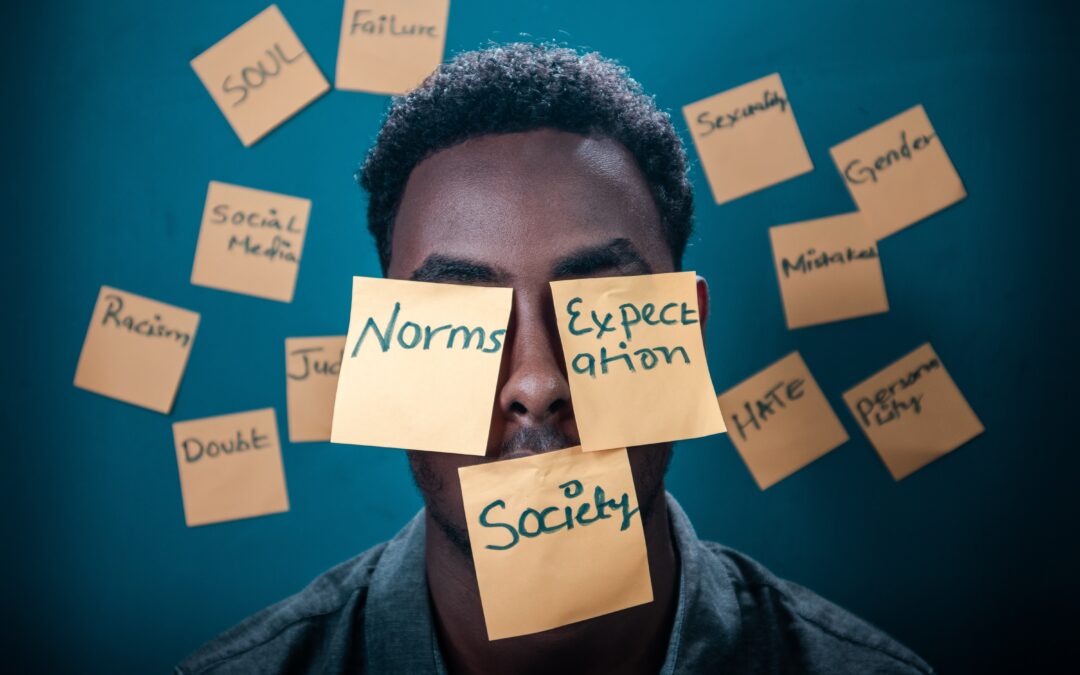Black History Month, celebrated in February each year, is a time to recognize the central role Black Americans have played in the United States in both the past and the present and to recognize and celebrate their achievements. Mental illness, without any further distinction, affects one in four Americans. However, Black Americans are disproportionately more likely to experience mental health black community issues and social stigma. Historical adversity, which includes slavery, sharecropping, and race-based exclusion from health, educational, social, and economic resources, translates into socioeconomic disparities experienced by Black Americans today. Black American mental health statistics show that socioeconomic status, in turn, is linked to mental health: People who are impoverished, homeless, incarcerated or have substance abuse problems are at higher risk for poor mental health. Mental health conditions do not discriminate based on race, color, gender, or identity. Anyone can experience the challenges of mental illness regardless of their background. However, background and identity can make access to mental health treatment much more difficult. Ongoing stigma and lack of access to health care act as barriers for anyone with a mental health condition, but experts argue there is a particular disparity when it comes to minorities, especially Black Americans, which can contribute to individuals not receiving proper support or treatment to feel better.
According to the Health and Human Services Office of Minority Health, Black adults in the U.S. are more likely than white adults to report persistent symptoms of emotional distress, such as sadness, hopelessness and feeling like everything is an effort. Black adults living below the poverty line are more than twice as likely to report serious psychological distress than those with more financial security.
Despite the needs, only one in three Black adults who need mental health care receive it. According to the American Psychiatric Association’s Mental Health Facts for African Americans guide, they are also:
- Less likely to receive guideline-consistent care
- Less frequently included in research
- More likely to use emergency rooms or primary care (rather than mental health specialists)

Barriers To Mental Health Care
Socioeconomic Disparities
Socioeconomic factors can make treatment options less available. In 2018, 11.5% of Black adults in the U.S. had no form of health insurance.
The Black community, like other communities of color, are more likely to experience socioeconomic disparities such as exclusion from health, educational, social and economic resources. These disparities may contribute to worse mental health outcomes.
Stigma
Negative attitudes and beliefs towards people who live with mental health conditions is pervasive within the U.S. and can be particularly strong within the Black community. One study showed that 63% of Black people believe that a mental health condition is a sign of personal weakness. As a result, people may experience shame about having a mental illness and worry that they may be discriminated against due to their condition.
For many in the Black community, it can be incredibly challenging to discuss the topic of mental health due to this concern about how they may be perceived by others. This fear could prevent people from seeking mental health care when they really need it.
Additionally, many people choose to seek support from their faith community rather than seeking a medical diagnosis. In many Black communities in the U.S., the church, mosque or other faith institution can play a central role as a meeting place and source of strength.
Faith and spirituality can help in the recovery process and be an important part of a treatment plan. For example, spiritual leaders and faith communities can provide support and reduce isolation. However, they should not be the only option for people whose daily functioning is impaired by mental health symptoms.
Provider Bias and Inequality of Care
Black people have historically been negatively affected by prejudice and discrimination in the health care system in the US. And, unfortunately, many Black people still have these negative experiences when they attempt to seek treatment. Provider bias, both conscious and unconscious, and a lack of cultural competency can result in misdiagnosis and inadequate treatment. This ultimately can lead to mistrust of mental health professionals and create a barrier for many to engage in treatment.
Black people may also be more likely to identify and describe physical symptoms related to mental health black community problems. For example, they may describe bodily aches and pains when talking about depression. A health care provider who is not culturally competent might not recognize these as symptoms of a mental health condition. Additionally, Black men are more likely to receive a misdiagnosis of schizophrenia when expressing symptoms related to mood disorders or PTSD.
Treatment Issues
- Black people are more often diagnosed with schizophrenia and less often diagnosed with mood disorders compared to white people with the same symptoms. Additionally, they are offered medication or therapy at the lower rates than the general population.
- Black people are over-represented in our jails and prisons. Black people make up 13 percent of the general U.S. population, but nearly 40 percent of the prison population. Mental health black community conditions, specifically those involving psychosis, are more likely to be in jail or prison than people of other races.
- Because less than 2 percent of American Psychological Association members are Black, some may worry that mental health care practitioners are not culturally competent enough to treat their specific issues.
- Stigma and judgment prevent Black people from seeking treatment for their mental illnesses. Research indicates that Blacks Americans believe that mild depression or anxiety would be considered “crazy” in their social circles. Furthermore, many believe that discussions about mental illness would not be appropriate even among family.
Working to break down the barriers
Black History Month is a celebration of all Black people, however, every month of the year professionals and society, alike, should be working to break down barriers for all minorities, including Black Americans, to eliminate the stigma associated with mental health. Black people should have unlimited access to mental health, eating disorder and substance abuse resources and care, regardless of their social or financial status. It starts from the bottom up, meaning that this is a grassroots issue. Additionally, there needs to be an increase in the number of Black mental health professionals and greater cultural competency in those currently in the field and an increased in education in the faith communities about the role of professional mental health black community and how they can work together.

